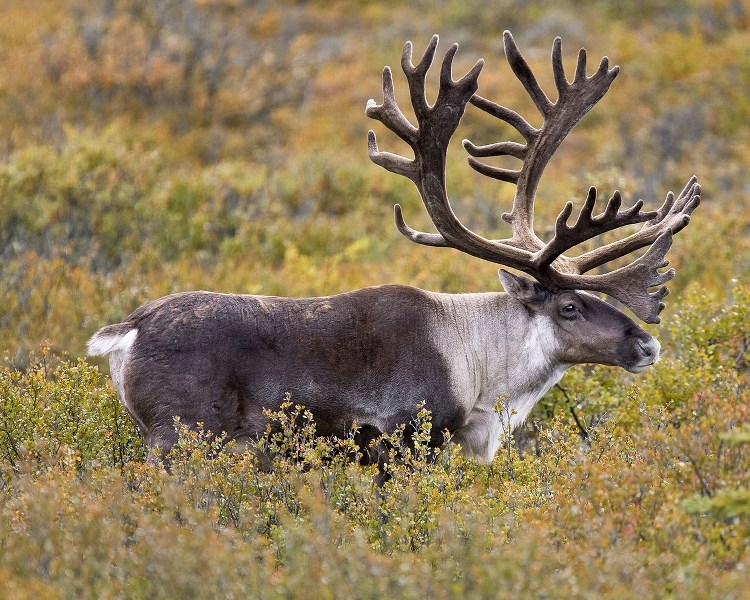The caribou population across Canada is dwindling, and the federal government simply won't have it.
In 2012, the Government of Canada issued a requirement that all provinces adopt plans for caribou recovery by 2017. The provincial government has released details of their plan to increase the population of the species in Alberta, and over the next few months, they will seek public feedback on the draft plan.
On Feb. 27, the province will be hosting a public information session in Cold Lake as part of their Phase 2 engagement. The details havn't been ironed out, but residents will likely learn how the plan will impact their local area, and how the government plans to reach their end-goal of 65 per cent undisturbed caribou habitat.
“What we need to do is make sure the Alberta government understands that we understand this is a 40-year plan that's moving forward. We also understand we have a really big target when it comes to making it to 65 per cent undisturbed. We need to put balance to the economy,” said Bonnyville-Cold Lake MLA Scott Cyr. “With just over 100 animals on the Alberta side of this range, we need to be looking at balance when it comes to the 35,000 or 40,000 residents within our constituency. There needs to be work, but there also needs to be the protection of animals, and we need to find that balance.”
The Cold Lake caribou range is home to a boreal woodland caribou population of over 100 caribou. The area is over 672,000-hectres, and currently, is made-up of portions of the Cold Lake Air Weapons Range and the MD of Bonnyville
Much of the caribou range is used for the extraction of natural resources, such as oil, gas, timber, and gravel. Of the 672,000-hectres, 35 per cent is taken up by the forestry industry, while over 60 per cent are oil sands, and 56 per cent is petroleum and natural gas.
Only 15 per cent of the range is defined as undisturbed habitat.
Cyr is concerned that reclamation of the land will result in the downfall of the oil sands industry in the area.
“This seems to be a pretty strong target that they have set. It's an over 300 per cent increase of undisturbed habitat in our constituency that they're trying to change,” he said. “I can't see how they won't disrupt our oil and gas industry. I have concerns that it might cost us jobs in the long run for our oil and gas sector. This is something we're already struggling with, is job losses. Adding more job loss to our constituency is just unacceptable.”
The Cold Lake First Nations (CLFN) has often expressed their views on caribou recovery.
Chief Bernice Martial said although they have had limited time to review the range plan they're cautiously optimistic.
“The plan prescribes no specific actions which could be viewed as protection for critical caribou habitat. Rather, it lays out some tools, which, if applied rigorously, could potentially meet the requirements of the Species at Risk Act (SARA).”
The purpose of SARA is to prevent wildlife species in Canada from disappearing.
Although CLFN is pleased to see a plan is being put forward, “plans are only as good as the actions that follow from them,” Martial stated.
“These actions will be difficult, and will test our collective resolve to protect the natural world which supports all of us,” continued Martial. “There is not one person in Canada that doesn't depend on the water, the air, or the land for survival. The requirements of caribou protection will put long-term conservation goal directly against short-term profits. Our Nation (CLFN) stands ready to work with the federal and provincial governments on this issue. However, nothing less than the full protection of SARA is acceptable to us.”
Although Cyr is showing concern over the 65 per cent reclamation goal, he pointed out he isn't against the protection of caribou, but feels there are options when it comes to maintaining the species.
“If we're looking at species at risk, maybe we need to consider rearing facilities near Cold Lake so we can start to look at stabilizing the caribou population through fenced-off safe places for them,” Cyr explained. “I think this is, by far, our best plan. I think over the next 40 years, we can look at reclamation, but it all depends on how aggressive the provincial and federal governments are. I'm unsure how we're going to get to 65 per cent of undisturbed.”
Over the years, Environment Canada has seen a decline in the caribou population for the Cold Lake range since tracking their population growth in 1999.
Martial believes these issues are a direct result of “decades of mismanagement of our traditional territory by all levels of government.”
Regardless of what lead the province to this dire situation, Cyr expressed the importance of balancing sustainability of caribou and the development of the region.
“Right now, people are thinking the caribou are something to protect, which I fully, whole-heartedly agree. There is no doubt that we need to ensure any animals that are at risk, especially when it comes to extinction, is something that we address,” he said. “The problem is, I don't think people realize, that right now, a lot of northern Alberta is captured by these caribou range plans. Development in these areas are pretty much going to be at a standstill. We're going to see no development in these areas aside from existing development that's already more or less put forward from the energy companies, as well as other businesses.”
He encourages residents to attend the information session to learn more, ask questions, and express concerns.
“This is a really big deal for us, and getting that message out to our local constituents needs to be a priority,” Cyr added. “If they do this (reclamation) too quickly, it could literally shut down our oil sands.”



